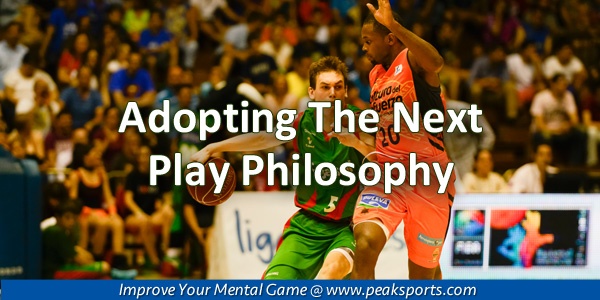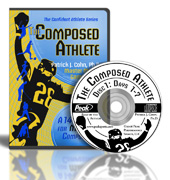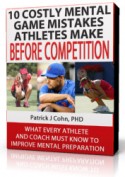How Athletes Can Overcome Mistakes
One of the hardest things for any athlete is to move forward after a mistake and focus “in the moment.”
Yet athletes are constantly told by coaches to forget about the last play, the previous point or the mistake that happened.
Think about a time when, in the heat of battle, you made a critical mistake…
For example, the gymnast that falls off the balance beam, the goal keeper that froze and let in a cheap goal, the tennis player that slammed the ball long when he had his opponent leaning the opposite way…
You probably felt a rush of negative emotions (frustration, anger, embarrassment) flow through your body and mind.
You look at your coach and your coach says,
“Forget about that mistake.”
It is not like you think,
“Hey that’s great advice, I feel better now.”
In fact, you probably grab onto the most profound word in that sentence, MISTAKE, and replay it in your mind until you are totally taken out of your game…
You know performing in the moment is necessary, but it seems impossible to focus to do after you make a stupid mistake or error on a routine play.
Why is it so difficult to let go of that stupid mistake?
Related: Helping Perfectionist Athletes Let Go of Mistakes
One explanation is that you are human.
When you make a mistake, it’s normal to be upset. If you’re never upset after a mistake, either you don’t care or you expect to always under-perform.
The second explanation is that you were not taught how to let go of mistakes, have not practiced the skill of focusing in the moment, or have not learned how to refocus after a mistake.
Mike Krzyzewski, head basketball coach for the Duke Blue Devils understands the value of teaching the ability to focus, in addition to learning the “X’s” and “O’s” of the game.
KRZYZEWSKI: “To waste time lamenting a mistake or celebrating success is distracting and can leave you and your team unprepared for what you are about to face. It robs you of the ability to do your best at that moment and to give your full concentration.”
Krzyzewski teaches something he calls the “next play” philosophy and there is no denying that this philosophy has helped his teams win five national championships, appear in 12 Final Four games and take home 26 ACC regular-season and tournament titles.
This “next play” philosophy or mindset was ingrained in him when he was an undergraduate at the U.S. Military Academy.
KRZYZEWSKI: “It’s more like a West Point thing, like what’s your next mission? So, whenever you got knocked back individually and collectively [as a team], they taught you, ‘OK, next play. What am I going to do next?'”
No matter what your sport, you can adopt Krzyzewski’s successful philosophy and, with some practice, you can learn to quickly re-focus after a mistake.
A Tip For Adopting The ‘Next Play’ Philosophy:
Process the mistakes and start asking yourself, “What’s next?”
This prompt helps you focus on what you have to do next. This gets your head out of the last play and puts your focus in the present moment.
If you consistently ask yourself this question, you will develop the habit of focusing on the present moment.
Athletes that judge themselves during their performance can apply the same strategy. Instead of thinking about how well you performed the last play or skill, tell yourself “NEXT.”
 Learn Mental Game Strategies to Improve Composure in Sports!
Learn Mental Game Strategies to Improve Composure in Sports!
How much better would you perform if you have total confidence and composure to perform your best in crunch-time?
How do you develop maximum composure and become a crunch-time performer?
You can learn to stop performance anxiety quickly, be poised, calm and in control during those “critical moments” that define your greatness!
Check out, The Composed Athlete: A 14-Day Plan For Maximum Composure.
The Composed Athlete consists of two 80-minute CD’s with a 70-page step-by-step workbook that guides you through the program each day. It is a complete system for conditioning your mind to have maximum composure in competition.
Learn more about The Composed Athlete…
What are mental game customers saying about our program?
“Dr. Cohn, we had a great season. We finished second in the State Tournament. We scored 163 points, which is 11 more than we scored the year we won the state tournament. We had three individual state champs. We really improved our mental preparation in the post season. The kids bought in and really worked at it. We will definitely need you again next year. Hopefully, you can help us reach our goals next year.”
~Coach Jim Bird, Head Coach Osceola High School
“Your response to the throwing problem in front of the coach covers so many situations in life…that is the beauty of playing sports…the life learning experiences. Keep up the good work…you are the best mental coach.”
~Bill Brennan, sports parent
Boost Your Self-Confidence And Focus With Expert Mental Game Coaching!
If you’re a top performer during practice but find yourself under-performing in competition, the most likely culprit holding you back is your mental game.
Master mental game coach Dr. Patrick Cohn can help you overcome your mental game issues with one-on-one personal mental game coaching.
You can work with Dr. Patrick Cohn himself in Orlando, Florida or via Skype, FaceTime, or telephone. Call us toll free at 888-742-7225 or contact us for more information about the different coaching programs we offer!
What are our mental game coaching students, parents and coaches saying?
“Both of the last 2 weekends, Nicolas had high-pressure basketball tournaments where he really showed improvement and maturity! He reacted very calmly to missed shots and mistakes and was very poised in the very close finals game. We have never seen him so composed and locked-in on the issue at hand! He has also realized that and tells us that he feels more calm and confident than before.”
~Alex Mylonas, Nicolas’ father
“First, I would like to thank you for the help given to me through your programs, ‘The Confident Athlete’ and ‘The Focused Athlete.’ I have made tremendous sacrifices though all these years to become a top Olympic Trap shooter but something was missing. This missing part was with my mental game. My scores increased tremendously in record time and other said that I was a different shooter.”
~Mario Kapodistria
Download Our FREE Mental Toughness Report!
Download your FREE Mental Toughness Report and discover if you are making one or more of theses ‘costly’ mental game mistakes before competition.
You’ll:
- Discover if those pregame jitters are positive or negative.
- Learn the important pregame mental skills to perform your best.
- Learn how your mental game might sabotage your success in sports.
- Identify mistakes in your per-competition mental preparation.
Download The Mental Toughness Report:
You will also receive regular updates of more mental toughness tips to boost your performance in sports!
What are mental coaching students, parents and coaches saying?
“My wife and I immediately applied your eBook mental toughness tips and luckily we got a fast response. Over just four days we brought her up out of a slump to success. She had ‘permission to make mistakes,’ she came out of her funk. Amazing!”
~Glenn A. Grube, Sports Parent
“I have really enjoyed reading your tennis report. I just found your web site and I already have improved in my mental game. This past weekend I played with the amount of confidence I should have in myself.”
~Melanie Lewis, Junior Tennis Player


 Learn Mental Game Strategies to Improve Composure in Sports!
Learn Mental Game Strategies to Improve Composure in Sports!